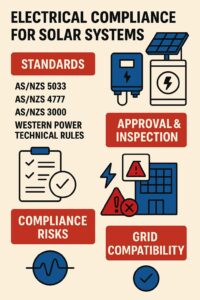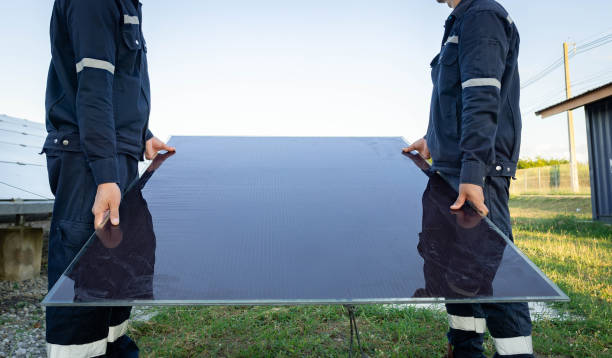Ensuring electrical compliance for solar systems in Perth is critical to avoiding penalties and maintaining connection to Western Australia’s regulated electricity grid. Homeowners and commercial operators must adhere to strict standards when installing solar photovoltaic (PV) systems, including grid-connected inverters and battery storage. Non-compliance can result in disconnection notices, voided warranties, and financial penalties.
Understanding Electrical Standards for Solar Systems in Perth
All solar installations in Perth must comply with both national and state-based electrical and safety standards. Key regulations include:
- AS/NZS 5033: Specifies installation standards for PV arrays.
- AS/NZS 4777: Regulates grid connection of energy systems via inverters.
- AS/NZS 3000 (Wiring Rules): Governs all general electrical installations.
- Western Power Technical Rules: Apply to grid-connected systems under the WA electricity network.
Licensed electricians accredited by the Clean Energy Council (CEC) must carry out all system installations and sign off on compliance documentation. System owners are responsible for ensuring installers follow the correct protocols.
Approval & Inspection Requirements
Before any solar installation is energised, several steps are required to meet compliance:
- Pre-Approval from Western Power or Horizon Power: All grid-connected systems require pre-approval based on system capacity, location, and network conditions.
- Notice of Completion (NOC): Must be lodged by the licensed electrician via the WA Electrical Licensing Board.
- Electrical Safety Certificate: Provided to the system owner to confirm safety and code compliance.
- Metering Upgrade or Configuration: A bi-directional meter is mandatory for feed-in tariffs and net metering functionality.
- Post-Installation Audit: Random or targeted audits may be conducted by WA’s Department of Mines, Industry Regulation and Safety (DMIRS).
Delays in any of these processes can result in non-compliance penalties or postponed grid connection.
Common Compliance Risks in Perth Solar Installations
Failing to comply with regulations can have severe consequences. Common issues include:
- Incorrect solar inverter settings that fail anti-islanding protections.
- Inadequate isolator or earthing systems.
- Using non-approved components or unlisted solar panels.
- Improper placement of DC isolators or conduits.
- Failure to submit or complete required paperwork.
To mitigate these risks, engaging qualified CEC-accredited professionals is essential. Each component, from the panels to the inverter and mounting systems, must meet relevant standards and be listed on the CEC-approved product list.

Grid Compatibility & Network Protection Settings
To ensure grid stability, solar systems must not export power during outages (anti-islanding), must meet voltage ride-through requirements, and should not interfere with network voltages or frequencies. These settings are controlled by the solar inverter, which must be configured according to Western Power’s guidelines. If non-compliant, the inverter may be blocked from exporting or trigger network disconnection.
The Role of Solar Batteries in Compliance
With the rise in residential and commercial battery storage, additional regulations apply to ensure safety and compatibility. A solar battery in Perth must be installed with compliant hybrid inverters or separate battery inverters that also meet AS/NZS 4777 and CEC certification requirements. Batteries must be housed in ventilated enclosures with suitable clearance and must follow relevant fire and emergency response guidelines.
Conclusion: Ensuring Safe & Compliant Solar Installations
To avoid fines, delays, or grid disconnection, Perth property owners must take electrical compliance seriously. Choosing a certified installer, following the correct application process, and ensuring all electrical components meet national and state standards are non-negotiable steps.
Whether upgrading to a solar inverter in Perth, integrating a solar battery, or investing in new solar installations Perth wide, compliance protects both your investment and the broader electricity network.
For reliable installation, compliance auditing, and system upgrades, consult a licensed and CEC-accredited solar provider to ensure full regulatory alignment from day one.

